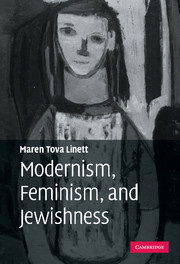Book contents
- Frontmatter
- Contents
- Acknowledgments
- List of abbreviations
- Introduction: imagined Jews and the shape of feminist modernism
- 1 “Strip each statement of its money motive”: Jews and the ideal of disinterested art in Warner, Rhys, and Woolf
- 2 Transformations of supersessionism in Woolf and Richardson
- 3 Adding bathrooms, fomenting revolutions: modernity and Jewishness in Woolf and Warner
- 4 The race must go on: gender, Jewishness, and racial continuity in Barnes and Richardson
- 5 The “No time region”: time, trauma, and Jewishness in Barnes and Rhys
- 6 Metatextual Jewishness: shaping feminist modernism
- Notes
- Works cited
- Index
1 - “Strip each statement of its money motive”: Jews and the ideal of disinterested art in Warner, Rhys, and Woolf
Published online by Cambridge University Press: 22 September 2009
- Frontmatter
- Contents
- Acknowledgments
- List of abbreviations
- Introduction: imagined Jews and the shape of feminist modernism
- 1 “Strip each statement of its money motive”: Jews and the ideal of disinterested art in Warner, Rhys, and Woolf
- 2 Transformations of supersessionism in Woolf and Richardson
- 3 Adding bathrooms, fomenting revolutions: modernity and Jewishness in Woolf and Warner
- 4 The race must go on: gender, Jewishness, and racial continuity in Barnes and Richardson
- 5 The “No time region”: time, trauma, and Jewishness in Barnes and Rhys
- 6 Metatextual Jewishness: shaping feminist modernism
- Notes
- Works cited
- Index
Summary
When the historian J. A. Hobson caricatured Jews as “homo economicus” in his 1891 study Problems of Poverty, he provided a pithy label for the ubiquitous stereotype of the obsessively wealth-seeking Jew. Many eighteenth- and nineteenth-century authors, such as Maria Edgeworth, Charles Dickens, and Anthony Trollope, drew upon this stereotype to explore and protest the increasing commercialization of their cultures. Anglo-American modernist authors, on the other hand, with the notable exception of Edith Wharton, tended to eschew the literary progeny of Shylock, the greedy Jewish financiers and swindlers through whom the earlier authors voiced their disgust with the excesses of industrial capitalism. (This is not to say, as will become clear, that the prototype of Shylock was irrelevant to their characterizations.) Their reluctance was due perhaps not so much to their understanding that the stereotype was spurious or unethical, but to their concern that as a stock figure it suggested the Victorian and Edwardian realism against which they defined themselves.
However, the alleged financial power of Jews did come close to home for early twentieth-century writers because it had become linked with the accusation that Jews controlled publishing houses and the press. William Brustein notes that “[a]s the nineteenth century unfolded, economic anti-Semites would … charge that Jews inordinately controlled the major means of production.”
- Type
- Chapter
- Information
- Modernism, Feminism, and Jewishness , pp. 32 - 59Publisher: Cambridge University PressPrint publication year: 2007



